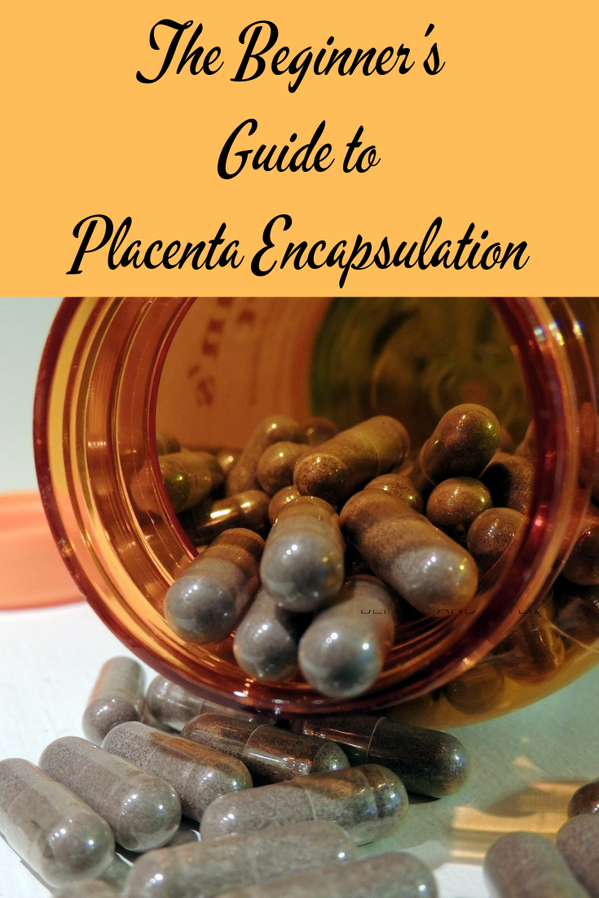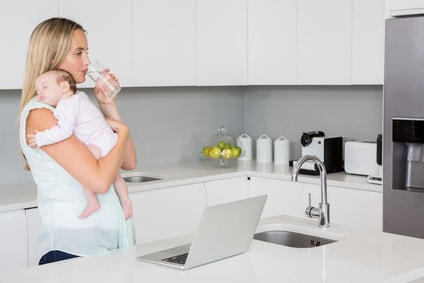What is placenta encapsulation?
Placenta encapsulation is the process of taking the placenta, processing it and placing it into capsules to consume after childbirth.
Placenta has been consumed in various forms for centuries especially in Traditional Chinese Medicine where human placenta is considered an herb and used to treat various illnesses or medical issues. In modern times, placenta is dried and placed into capsules for easy consumption.
Your placenta is processed over a two day period. Each day the encapsulator is in your home for approximately 1-2 hours. Birth: Before and After provides all the supplies each day and will only need access to a small amount of counter or table space, your sink, a stovetop burner, and an outlet.
Your space is cleaned and sanitized before, during and after the process each day.
Placenta has been consumed in various forms for centuries especially in Traditional Chinese Medicine where human placenta is considered an herb and used to treat various illnesses or medical issues. In modern times, placenta is dried and placed into capsules for easy consumption.
Your placenta is processed over a two day period. Each day the encapsulator is in your home for approximately 1-2 hours. Birth: Before and After provides all the supplies each day and will only need access to a small amount of counter or table space, your sink, a stovetop burner, and an outlet.
Your space is cleaned and sanitized before, during and after the process each day.
What are the benefits of placenta encapsulation?
There are no thorough studies on the benefits of placenta encapsulation at this time. All the information we have is from Traditional Chinese Medicine and anecdotal information provided by thousands and thousands of people who have consumed their placenta after childbirth.
The most common reason people choose to encapsulate their placenta is to balance hormones after childbirth to ease or eliminate postpartum depression.
Other potential benefits of placenta capsules include:
There are lots of theories on how the placenta might help with postpartum recovery. Here is what Birth: Before and After most strongly believes:
During pregnancy, the body makes up to 3x as many stress fighting hormones (as well as additional hormones to support the pregnancy) These hormones are stored or created within the placenta. After the birth, many people experience a drastic dip in hormone levels as the body adjusts to the birth. This can cause fatigue, sadness, overwhelm and depression. By consuming placenta capsules, some of those hormones are returned to the body to help ease the transition.
Traditional Chinese Medicine (TCM) believes that the body must remain in balance for wellness. Any time that the body becomes out of balance in various forms, illness may set in. Pregnancy and childbirth often cause the body to become out of balance. The placenta, which is considered an herb in TCM, helps the body return to balance after childbirth.
The most common reason people choose to encapsulate their placenta is to balance hormones after childbirth to ease or eliminate postpartum depression.
Other potential benefits of placenta capsules include:
- Speed healing
- More energy
- Experience less overwhelm
- Smooth transition from pregnancy to postpartum
- Improved breastmilk production (this potential benefit is controversial)
There are lots of theories on how the placenta might help with postpartum recovery. Here is what Birth: Before and After most strongly believes:
During pregnancy, the body makes up to 3x as many stress fighting hormones (as well as additional hormones to support the pregnancy) These hormones are stored or created within the placenta. After the birth, many people experience a drastic dip in hormone levels as the body adjusts to the birth. This can cause fatigue, sadness, overwhelm and depression. By consuming placenta capsules, some of those hormones are returned to the body to help ease the transition.
Traditional Chinese Medicine (TCM) believes that the body must remain in balance for wellness. Any time that the body becomes out of balance in various forms, illness may set in. Pregnancy and childbirth often cause the body to become out of balance. The placenta, which is considered an herb in TCM, helps the body return to balance after childbirth.
Is placenta encapsulation safe?
Again, we have no strong scientific evidence that placenta encapsulation is completely safe at this time. What we do have in information collected from thousands and thousands of people who have used placenta capsules during their postpartum without negative effects.
If you have specific concerns about drug safety or pregnancy/birth conditions or contraindications please reach out to BB&A for detailed information.
Birth: Before and After follows several safety measures including
If you have specific concerns about drug safety or pregnancy/birth conditions or contraindications please reach out to BB&A for detailed information.
Birth: Before and After follows several safety measures including
- Universal precausions which means that we treat every placenta we process as if it has a bloodborne disease. Now, that may sound uncomforable to a client, but what it actually does is make sure that any equipment used during the process is cleaned and sanitized properly. This is a very valuable step in the process and not every encapsulator will follow these standards.
- Food handling basics which involve the placenta staying "food safe" until processing begins. This is one of the reasons BB&A supplies a new, clean cooler for every client.
- Chain of command knowledge. BB&A wants you to know exactly where your placenta is at every moment. We don't to "hand offs" to doulas and other professionals. The placenta stays in your control until we start the process.
How to hire a placenta encapsulation professional.
Hiring a professional encapsulator can seem overwhelming. How do you know if they are a professional and have taken a training or if they follow basic health and safety guidelines?
You can start by asking for references from friends, posting on mom Facebook groups, and discussing encapsulation with your provider. Always reach out to potental placenta encapsulators or placenta encapsulation specialists early to make sure they are available and still provide the service.
You can also do a brief interview with the potential encapsulator either in person, via email, online via ZOOM, or over the phone. Check out this article on questions you can ask when interviewing a potential placenta encapsulator.
You can start by asking for references from friends, posting on mom Facebook groups, and discussing encapsulation with your provider. Always reach out to potental placenta encapsulators or placenta encapsulation specialists early to make sure they are available and still provide the service.
You can also do a brief interview with the potential encapsulator either in person, via email, online via ZOOM, or over the phone. Check out this article on questions you can ask when interviewing a potential placenta encapsulator.
Common questions about placenta encapsulation:
What do placenta capsules taste like?
Your placenta capsules themselves should not have a taste. The dried placenta powder is placed inside a capsule, so that there is no taste and to make consumption easy for clients. Birth: Before and After wipes each capsule with a sterile gauze so that there is no placenta powder residue on the outside of the capsules to maximize your satisfaction.
If your encapsulator does not take the additional care in wiping the outside of hte capsules, there can be excess placenta powder on the outside of the capsule. The placenta powder will taste similar to an organ meat like liver or heart. Most people do not enjoy the flavor and would prefer to not experience it.
Some placenta encapsulators will attempt to hide the taste of the placenta powder by using flavored capsules rather than wiping the capsules. This adds additional sugars and flavorings to the capsules which could potentially lessen the potental benefit or create a negative effect to the capsules.
If your encapsulator does not take the additional care in wiping the outside of hte capsules, there can be excess placenta powder on the outside of the capsule. The placenta powder will taste similar to an organ meat like liver or heart. Most people do not enjoy the flavor and would prefer to not experience it.
Some placenta encapsulators will attempt to hide the taste of the placenta powder by using flavored capsules rather than wiping the capsules. This adds additional sugars and flavorings to the capsules which could potentially lessen the potental benefit or create a negative effect to the capsules.
Does the placenta encapsulation process smell?
Every single placenta is different and every client has different sensitivities to odors. Most people only notice a slight odor during the steaming of the placenta if they are in the same room or in a very small space. If you are very sensitive to smells, Birth: Before and After recommends staying in another room of your home during steaming or using a scented candle during the process. Some clients prefer have the placenta encapsulation process started while they are still in the hospital.
How many placenta capsules do I take?
Birth: Before and After gives clients a complete guide to consuming your placenta capsules. Some clients may want to adjust the consumption guidelines to gain maximum benefit. You may always reach out to your encapsulationist, should you have any questions. Generally, clients will start by consuming multiple capsules per day and slowly decrease the amount and frequency.
Most people choose to start consuming their placenta capsules between day 3-14 postpartum.
Birth: Before and After recommends consuming all your placenta capsules to get the most benefit.
Most people choose to start consuming their placenta capsules between day 3-14 postpartum.
Birth: Before and After recommends consuming all your placenta capsules to get the most benefit.
Why does Birth: Before and After process the placenta at my home?
Birth; Before and After does the 2 day placenta encapsulation process in your home. Before you back away from encapsulation, read some of the benefits here:
- You get a childbirth professional in your home
- You know the standards in which your placenta was processed (cleanliness, safety precautions, food handling, etc)
- You know for sure it's your own placenta
- You can be as hands on or hands off as you want
- You get your kitchen sink cleaned and sanitized. We hope that your space is just a little cleaner than when we arrived
- You can ask your encapsulator questions you may have about popstartum or baby care
- You can process your birth with a professional that won't judge your decisions


 RSS Feed
RSS Feed
